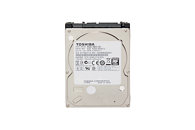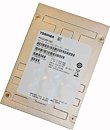Sunday, January 6th 2013

Toshiba Announces Cryptographic-Erase and Self-Encryption Features for New SSDs/HDDs
The Storage Products Business Unit of Toshiba America Electronic Components, Inc., a committed technology leader, announces new enterprise-grade SATA SSD models supporting cryptographic-erase and self-encrypting drive (SED) models, one an enterprise SAS solid state drive (eSSD) and the other a mobile SATA hard disk drive (HDD). Collectively, these four new 2.5-inch storage device models provide both IT system and PC system administrators with more effective tools to help secure sensitive business information.
For the enterprise, the PX02AMU value line of SATA eSSD models and PX03ANU read-intensive line of SATA SSD models feature cryptographic-erase. In addition, the PX02SMQ/U series offers Trusted Computing Group (TCG) enterprise protocol self-encryption and cryptographic-erase support in high-performance eSSD SAS models.For mobile computing, the MQ01ABU***W series provides self-encryption, cryptographic-erase and TCG-Opal protocol support in a slim 7 mm height with up to 500 GB of storage capacity. The MQ01ABU***W series also supports Toshiba's wipe technology, which allows systems designers to automatically cryptographic-erase data if an unexpected host attempts to access the HDDs or if a defined number of authentication failures occurs.
"According to Symantec, the average cost of an enterprise data breach is $5.5 million. System administrators can help to better secure sensitive data by using encrypted storage devices," said Scott Wright, product manager, Toshiba Storage Products Business. "Toshiba's latest eSSD and mobile HDD SED models provide the advanced security features companies need to properly sanitize SSDs in server and storage subsystems and ensure the security of private data on HDDs in mobile and desktop PCs to help prevent costly data breaches."
With the continued adoption of cloud computing and data warehousing, companies face additional challenges in securing critical business information to meet compliance requirements. To help safeguard confidential data, these new Toshiba models use government-grade Advanced Encryption Standard (AES) 256-bit self-encryption, and the PX02SMQ/U series SEDs support the TCG Enterprise Security Subsystem Class (SSC) protocols to provide additional security features.
Unlike a regular disk erase, which uses lengthy over-write operations, the Cryptographic-Erase function simply regenerates the SED drive's encryption key, effectively invalidating all previously stored user data. This allows SED storage devices to be quickly and securely sanitized before re-allocation, redeployment or retirement.
● The PX02AMU and PX03ANU are SATA MLC SSDs that provide transparent onboard hardware encryption to enable fast and secure cryptographic-erase using the industry-standard ATA Enhanced Secure Cryptographic Erase function. The PX02AMU has storage capacities of 100 GB, 200 GB and 400 GB, and the PX02ANU includes 55 GB, 120 GB, 240 GB and 480 GB models. Both are suited for entry to mid-range server and storage systems, as well as read-intensive and boot devices for datacenter-optimized servers and scale-out storage systems.
● The PX02SMQ/U series is an enterprise-class SAS MLC SSD with available storage capacities of 200 GB, 400 GB, 800 GB and 1.6 TB. Support of both SANITIZE Cryptographic-Erase and the TCG Enterprise SSC makes the PX02SMQ/U series suitable for management and protection of confidential data on mission-critical and business-critical server and storage systems.
● The MQ01ABU***W series are 7 mm high SATA 2.5-inch 5,400 RPM HDD SEDs with available storage capacities of 250 GB, 320 GB and 500 GB. Support of both the ATA Enhanced Secure Cryptographic Erase function and the TCG-Opal SSC protocols makes the MQ01ABU series ideal for encrypting and protecting access to confidential data stored on mobile and desktop PCs protected by security management applications.
Sample shipments of the PX02AMU and PX03ANU SATA eSSD drives are scheduled for January 2013. In the first quarter of 2013, sample shipments are scheduled to begin for the PX02SMQ/U SAS eSSD SED drives and MQ01ABU***W series mobile SATA HDD SED.
Self-encryption and other security features are also available on select Toshiba enterprise-class 3.5-inch and 2.5-inch HDD models, as well as select 2.5-inch client SSD and HDD models. Toshiba is also working on FIPS 140-2 certification on select SED products to meet government-class security requirements.
For the enterprise, the PX02AMU value line of SATA eSSD models and PX03ANU read-intensive line of SATA SSD models feature cryptographic-erase. In addition, the PX02SMQ/U series offers Trusted Computing Group (TCG) enterprise protocol self-encryption and cryptographic-erase support in high-performance eSSD SAS models.For mobile computing, the MQ01ABU***W series provides self-encryption, cryptographic-erase and TCG-Opal protocol support in a slim 7 mm height with up to 500 GB of storage capacity. The MQ01ABU***W series also supports Toshiba's wipe technology, which allows systems designers to automatically cryptographic-erase data if an unexpected host attempts to access the HDDs or if a defined number of authentication failures occurs.
"According to Symantec, the average cost of an enterprise data breach is $5.5 million. System administrators can help to better secure sensitive data by using encrypted storage devices," said Scott Wright, product manager, Toshiba Storage Products Business. "Toshiba's latest eSSD and mobile HDD SED models provide the advanced security features companies need to properly sanitize SSDs in server and storage subsystems and ensure the security of private data on HDDs in mobile and desktop PCs to help prevent costly data breaches."
With the continued adoption of cloud computing and data warehousing, companies face additional challenges in securing critical business information to meet compliance requirements. To help safeguard confidential data, these new Toshiba models use government-grade Advanced Encryption Standard (AES) 256-bit self-encryption, and the PX02SMQ/U series SEDs support the TCG Enterprise Security Subsystem Class (SSC) protocols to provide additional security features.
Unlike a regular disk erase, which uses lengthy over-write operations, the Cryptographic-Erase function simply regenerates the SED drive's encryption key, effectively invalidating all previously stored user data. This allows SED storage devices to be quickly and securely sanitized before re-allocation, redeployment or retirement.
● The PX02AMU and PX03ANU are SATA MLC SSDs that provide transparent onboard hardware encryption to enable fast and secure cryptographic-erase using the industry-standard ATA Enhanced Secure Cryptographic Erase function. The PX02AMU has storage capacities of 100 GB, 200 GB and 400 GB, and the PX02ANU includes 55 GB, 120 GB, 240 GB and 480 GB models. Both are suited for entry to mid-range server and storage systems, as well as read-intensive and boot devices for datacenter-optimized servers and scale-out storage systems.
● The PX02SMQ/U series is an enterprise-class SAS MLC SSD with available storage capacities of 200 GB, 400 GB, 800 GB and 1.6 TB. Support of both SANITIZE Cryptographic-Erase and the TCG Enterprise SSC makes the PX02SMQ/U series suitable for management and protection of confidential data on mission-critical and business-critical server and storage systems.
● The MQ01ABU***W series are 7 mm high SATA 2.5-inch 5,400 RPM HDD SEDs with available storage capacities of 250 GB, 320 GB and 500 GB. Support of both the ATA Enhanced Secure Cryptographic Erase function and the TCG-Opal SSC protocols makes the MQ01ABU series ideal for encrypting and protecting access to confidential data stored on mobile and desktop PCs protected by security management applications.
Sample shipments of the PX02AMU and PX03ANU SATA eSSD drives are scheduled for January 2013. In the first quarter of 2013, sample shipments are scheduled to begin for the PX02SMQ/U SAS eSSD SED drives and MQ01ABU***W series mobile SATA HDD SED.
Self-encryption and other security features are also available on select Toshiba enterprise-class 3.5-inch and 2.5-inch HDD models, as well as select 2.5-inch client SSD and HDD models. Toshiba is also working on FIPS 140-2 certification on select SED products to meet government-class security requirements.


6 Comments on Toshiba Announces Cryptographic-Erase and Self-Encryption Features for New SSDs/HDDs
It's hands down the best method for making the data on a device unrecoverable short of turning the device to ash.
Of course, the goal of FDE-SE is a non-destructive method of sanitizing the drive so it can be used again.
If you're really, really paranoid you can always do a FDE-SE and then do any single pass erase and even forensic discovery will yield nothing usable on the drive.
If you are tin-foil-hat paranoid, do a FDE-SE and then destroy the device.